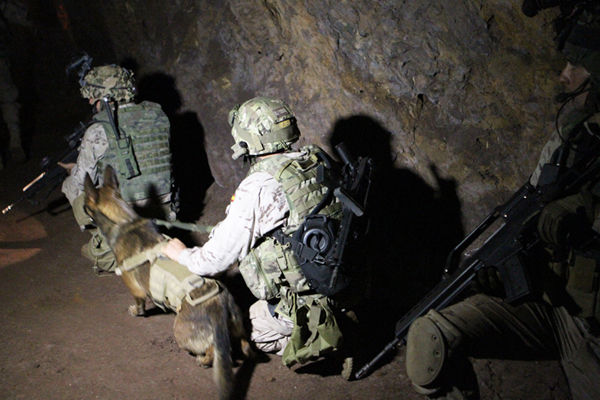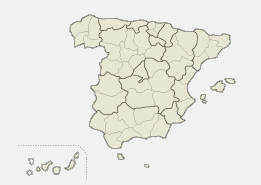- Home
- Latest News
- Full Article
The Legion’s Tunnel Warfare Unit makes its debut with an exercise at the Alquife mines
Tuesday, July 7, 2015
Number: 4419
The Legion’s Tunnel Warfare Unit (UCAS by its Spanish acronym) has made its debut with an exercise in the region of the Alquife mines (Granada) from 29 June to 2 July. The unit has reached its most complete configuration since its launch, a year ago.
The basis of the unit, an infantry section, has been strengthened by a sappers platoon with reconnaissance capabilities to detect explosive devices as well as by teams specialised in NBC, logistics, communications and cynology. UCAS is therefore a unit configured as a reinforced section consisting of 50 personnel.
The brigade was established by the Chief of the Army Staff as an experimental unit for the development of combat tactics and procedures in an underground environment. After several exercises and tests the unit reached its present structure within the 3rd Legion Regiment “Don Juan de Austria”, which has its headquarters in Viator (Almería). Its structure is aimed at dealing with the difficult conditions in which its members have to carry out their work (darkness, feelings of claustrophobia..) and the different situations they may have to confront. It therefore includes several combat and combat support elements and has been designed as a modular operating structure.

Trained dogs are very reliable (Photo: BRILEG)
Tunnel Warfare is gaining ground within the context of asymmetric conflicts (terrorist groups, insurgencies, organised crime…). In these types of conflict, tunnels and other underground cavities may be used as a platform to plan, organise and execute a variety of activities. Underground structures in urban areas and natural or artificial cavities in open areas provide ideal spots to hide people and weapons or to prepare attacks, coups, terrorist bombings, kidnappings… Such spaces are inherently difficult to control so they can be used for such activities to go unnoticed. Lack of information and deficient control of underground spaces therefore represent a significant risk to the forces operating on the surface. Hence the importance of this kind of warfare.
ARMY UNITS
- Araba Álava |
- Albacete |
- Alicante |
- Almería |
- Asturias |
- Ávila |
- Badajoz |
- Barcelona |
- Burgos |
- Cáceres |
- Cádiz |
- Cantabria |
- Castellón |
- Ceuta |
- Ciudad Real |
- Córdoba |
- A Coruña |
- Cuenca |
- Girona |
- Granada |
- Guadalajara |
- Gipuzkoa |
- Huelva |
- Huesca |
- Islas Baleares |
- Jaén |
- León |
- Lleida |
- Lugo |
- Madrid |
- Málaga |
- Melilla |
- Murcia |
- Navarra |
- Ourense |
- Palencia |
- Las Palmas |
- Pontevedra |
- La Rioja |
- Salamanca |
- Segovia |
- Sevilla |
- Soria |
- Tarragona |
- Santa Cruz de Tenerife |
- Teruel |
- Toledo |
- Valencia |
- Valladolid |
- Bizkaia |
- Zamora |
- Zaragoza



